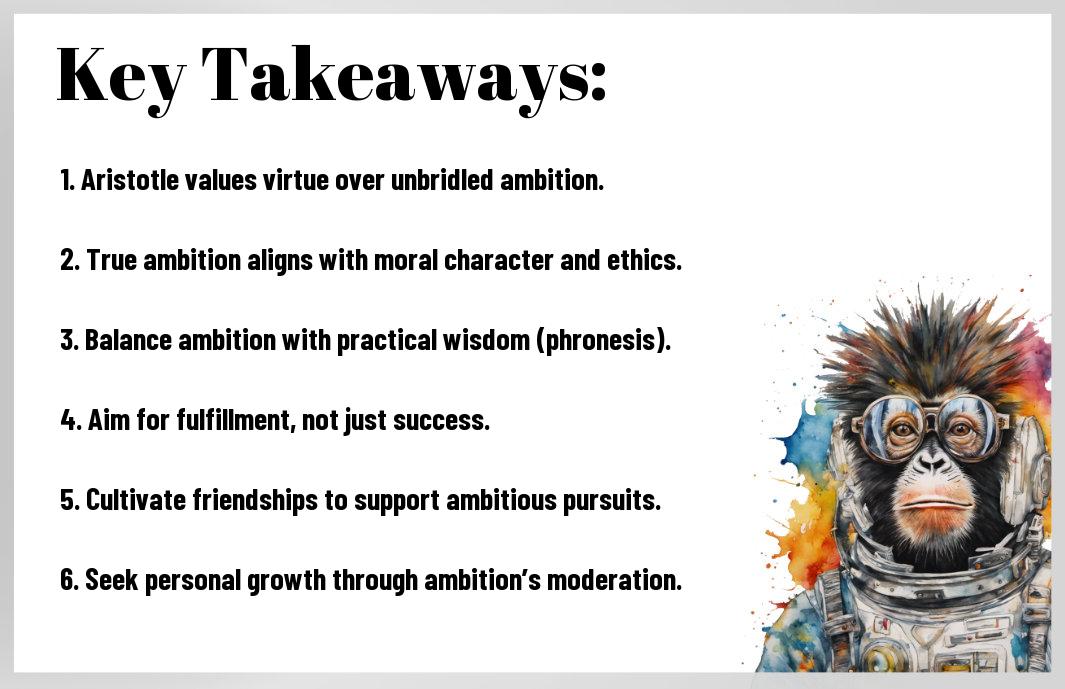Most of us chase ambition as if it’s the ultimate goal in life, but have you ever stopped to rethink what that actually means? I invite you to join me on a journey through Aristotle’s philosophy, which offers a refreshing perspective on ambition and fulfillment. By exploring his ideas, you might discover a more balanced approach to your ambitions that not only fuels your passions but also enriches your life and relationships. Let’s dive in and see how you can cultivate a deeper understanding of ambition today!
Key Takeaways:
- Virtue Ethics: Aristotle emphasizes that ambition should align with virtuous behavior, advocating for balance between personal goals and ethical considerations.
- Eudaimonia: The ultimate aim of ambition should be to achieve eudaimonia, or a flourishing life, rather than mere success or wealth.
- Prudence: Effective ambition requires practical wisdom (phronesis), encouraging individuals to make thoughtful decisions that benefit both themselves and the community.
- Moderation: Aristotle advocates for moderation in ambition, warning against extremes that could lead to hubris or unethical actions.
- Social Responsibility: True ambition encompasses a sense of responsibility towards society, reflecting Aristotle’s belief in the interconnectedness of individuals and their communities.
- Self-Reflection: Regular self-examination is vital to ensure that one’s ambitions are aligned with their values and the greater good.
- Collaborative Success: Engaging with others and valuing collective efforts can lead to more meaningful achievements, as highlighted in Aristotle’s views on friendship and community.

Understanding Ambition
What is Ambition?
One of the most profound aspects of ambition is its dual nature. It can manifest as a driving force that pushes individuals to achieve their goals, or it can lead to discontent and endless striving for more. As I reflect on this, I realize that ambition isn’t merely about reaching the top; it’s also about how we approach our aspirations and the values we hold dear during our journey. This philosophical perspective encourages me to evaluate my ambitions not just by outcomes but by the processes and choices I encounter along the way.
Types of Ambition
One way to categorize ambition is by distinguishing between intrinsic and extrinsic forms. Intrinsic ambition stems from personal fulfillment, passion, and self-improvement. In contrast, extrinsic ambition is driven by external rewards such as status, wealth, or recognition. Understanding these different types of ambition has helped me clarify my motivations and align them with my core values. In today’s fast-paced world, it’s easy to get caught up in the extrinsic demands that society places on us, resulting in a disconnect between what we aspire to accomplish and what truly fulfills us.
- Intrinsic Ambition: Driven by personal passion and self-fulfillment
- Extrinsic Ambition: Motivated by external rewards like fame or wealth
- Collective Ambition: Sharing and aligning goals within a group or community
- Short-Term Ambition: Focused on immediate achievements or goals
- Long-Term Ambition: Encompassing broader life visions and aspirations
After exploring these categories, I find that recognizing the type of ambition I resonate with allows me to channel my energy more effectively towards achieving my goals.
| Type of Ambition | Description |
| Intrinsic Ambition | Personal passion and self-growth-driven |
| Extrinsic Ambition | Motivated by society’s accolades or material gain |
| Collective Ambition | Goals that involve collaboration with others |
| Short-Term Ambition | Achieving immediate targets or objectives |
| Long-Term Ambition | Comprehending broader aspirations over a lifetime |
Further, I believe that the interplay between these types of ambition is vital in shaping our life trajectory. You might find that at different stages of your life, your ambitions can shift from one type to another. For instance, when I was younger, my ambitions were heavily extrinsic as I sought validation through achievements and recognition. However, as I grew, I began to cultivate a more intrinsic approach, focusing on personal interests and growth. It’s fascinating to observe how these motivations can evolve. Pay attention to your internal dialogues and the influences around you; they might lead you to redefine your aspirations.
- Reflect on your current ambitions and assess their origins.
- Consider how peer pressure might shape your extrinsic motivations.
- Evaluate the balance between immediate versus long-term goals.
- Seek support from peers to align collective ambitions.
- After identifying your driving forces, aim to cultivate a healthier blend of ambition types.
After contemplating these crucial categories, I’m continually inspired to adjust my pursuits in ways that resonate more authentically with who I am and what I want to contribute to the world. Who knows? You might find that your journey towards ambition offers you not just accomplishments but deeper satisfaction as well.
Aristotle’s Views on Virtue
Assuming you’re familiar with Aristotle’s ethical philosophy, you can appreciate the central role that virtue plays in his understanding of a good life. For Aristotle, virtue is not merely about following rules or adhering to societal expectations; instead, it represents a way of being that encourages balance and moderation in our lives. By cultivating virtues, we can navigate the complexities of our ambitions and desires, ultimately leading to a fulfilling life. It seems to me that embracing this perspective can help redefine what it means to be ambitious in a more holistic way, focusing not only on personal success but also on harmony with others and oneself.
The Golden Mean
Around the foundation of Aristotle’s philosophy lies the concept of the Golden Mean. He believed that virtue is about finding the ideal balance between extremes. For example, courage lies between recklessness and cowardice, while generosity exists between prodigality and stinginess. This idea invites you to reflect on your desires and ambitions and consider where they might fall on this spectrum. Instead of pursuing ambition with an all-or-nothing mindset, it encourages a more nuanced approach—understanding that even our greatest aspirations can lead to negative outcomes if taken to extremes.
Virtue as a Guiding Principle
Beside the Golden Mean, another crucial element in Aristotle’s views on virtue is that of virtue serving as a guiding principle in our decision-making. When you align your ambitions with virtuous living, you create a framework for making choices that reflect your values and contribute positively to your life and those around you. This perspective shifts ambition from being purely self-serving to something that can uplift both yourself and your community. As you navigate your journey, I believe it becomes vital to ask yourself how your ambitions align with virtues such as honesty, kindness, and integrity.
Due to this emphasis, your motivations can take on a more meaningful dimension. Instead of simply pursuing goals for the sake of achievement, you can reflect on how those goals contribute to a virtuous life. This allows for a more profound consideration of your ambitions, pushing you to engage in pursuits that not only satisfy your personal drive but also foster goodwill and ethical living. With this approach, ambition transforms into a powerful force for positive change, both in your life and the lives of others.

Ambition and the Pursuit of Eudaimonia
Defining Eudaimonia
Across various interpretations, eudaimonia is often translated as ‘happiness’ or ‘flourishing’, but I believe it encompasses much more than mere fleeting joy. It reflects a deep sense of fulfillment that comes from living in accordance with our true nature and realizing our full potential. By focusing on virtues, you can create a life that not only benefits you but also enriches the community around you. Eudaimonia is that sweet spot where personal well-being, ethical behavior, and social harmony intersect, creating a life that resonates with purpose and meaning.
One of the most important aspects of understanding eudaimonia, in my view, is recognizing that it’s not merely about achieving personal goals or accumulating wealth. Instead, it’s a holistic approach that encourages us to engage in activities that contribute positively to both our own lives and the lives of others. When I think about what it means to truly flourish, I feel inspired to cultivate relationships, engage in philosophy, and contribute to my community in meaningful ways. This transformative journey of self-discovery leads us to a life well-lived.
The Role of Ambition in Living Well
Above all, ambition can serve as a significant catalyst in our pursuit of eudaimonia. It’s that inner drive that propels you to strive for excellence, encouraging you to set goals that align with your virtues and passions. When ambition is grounded in a broader vision of living well, it transforms from a mere desire for success into a powerful tool for personal and communal growth. I’ve found that it’s crucial to channel your ambition in ways that resonate with who you truly are while also making a positive impact on those around you.
Further, I see ambition as the fire that ignites your journey toward eudaimonia. It allows you to reach for your potential and encourages you to step out of your comfort zone. However, it’s vital to ensure that this ambition reflects your values and is not just chasing after external markers of success. When I align my ambitions with my core values, I not only advance my own well-being but also contribute positively to the world. In that sense, ambition becomes a driving force for both personal fulfillment and social responsibility, guiding you toward a more meaningful life.
The Balance of Ambition and Contentment
Now, as I explore the balance of ambition and contentment, I can’t help but reflect on how these two concepts often seem at odds. Our culture tends to celebrate relentless ambition, pushing us to achieve more and more without considering the toll it can take on our personal happiness. However, Aristotle teaches us that true satisfaction arises from recognizing our limits and cultivating a sense of contentment with where we are at present. I find this perspective liberating; it encourages me to pursue my goals while also appreciating the smaller victories along the way, creating a harmonious existence instead of a constant state of striving. By embracing this equilibrium, I can nurture my drive but also allow space for gratitude, understanding that contentment doesn’t have to mean giving up on ambition.
Striving Without Overreaching
Across my journey, I’ve discovered that ambition can remain positive when it doesn’t turn into a pursuit that leaves me exhausted or disillusioned. Striving for improvement should empower rather than overwhelm me. I realize that it’s necessary to set realistic goals that challenge me but also align with my values and well-being. In this way, I can retain passion for my pursuits without crossing that fine line into frustration and burnout. By maintaining self-awareness, I navigate my ambitions with clarity, ensuring I don’t overreach and, instead, engage in pursuits that genuinely enrich my life.
Finding Joy in the Journey
Between the highs of achievements and the lows of setbacks, I’ve learned to celebrate the journey itself. Each step towards a goal can be filled with its own unique pleasures and lessons. It’s easy to get caught up in the destination, but I find that savoring the process cultivates a deeper appreciation for my experiences. Whether it’s enjoying the camaraderie of teamwork, learning from failures, or simply relishing the daily challenges, these moments are treasures that contribute to my overall sense of fulfillment. I aim to create a mindset that values the little things, knowing that they often bring the most joy.
A key aspect of finding joy in the journey lies in the mindfulness I bring to my experiences. By consciously focusing on the present, I learn to appreciate the laughter shared with colleagues, the thrill of overcoming obstacles, and the knowledge gained in moments of reflection. It’s a reminder that in pursuing ambition, I can find happiness not just in the end results but in the daily strides I take towards my aspirations. Embracing this mindset has transformed my experience, making each day feel rich with purpose and fulfillment.

Modern Implications of Aristotle’s Philosophy
Rethinking Success Today
About a decade ago, I found myself caught in a whirlwind of societal expectations about what success really means. Aristotle’s philosophy invites me to pause and reconsider my definition of success. It goes beyond wealth and accolades to include a sense of moral purpose and personal fulfillment. When I reflect on Aristotle’s concept of eudaimonia, or flourishing, I realize that true success incorporates my well-being, relationships, and contributions to my community. It’s about aligning my daily actions with my core values and passions rather than chasing a fleeting notion of achievement defined by others.
Cultivating a Healthy Ambition
Before I explore into how to cultivate a healthy ambition, it’s vital to acknowledge that ambition itself isn’t inherently good or bad. It’s a powerful driving force that, when aligned with virtuous intentions, can lead to significant personal growth and societal contributions. By rethinking how I approach ambition, I can ensure it serves me rather than consumes me. For instance, I’ve started to set goals that reflect my passions and contribute to my overall well-being rather than merely seeking recognition. This shift allows me to experience joy in the journey rather than fixating solely on end results.
Due to this reevaluation of my ambitions, I have noticed a remarkable change in my overall mindset. Embracing ambition as a means of personal growth rather than solely as a ladder to climb enables me to appreciate the milestones along the way. This approach has fostered a deeper sense of satisfaction and connection to my pursuits. Rather than pressuring myself to meet externally imposed standards, I now focus on nurturing my personal interests while aiming for fulfillment in my life’s work. This healthy ambition is not just about success; it’s about creating a balanced life that’s rooted in my values and sense of purpose.
To wrap up
Considering all points, I’ve realized that rethinking ambition through Aristotle’s philosophy opens up a refreshing perspective on how I define success and fulfillment in my life. Instead of solely chasing external accolades, I am inspired to focus on virtue, purpose, and cultivating meaningful relationships. Aristotle reminds us that true happiness comes from living a life aligned with our values and striving for excellence in our character, which resonates deeply with me. It’s about finding that balance between personal ambition and contributing to the well-being of those around us.
If you’re interested in delving deeper into this fascinating subject, I recommend listening to the podcast episode titled 39. How to Rethink Ambition: Kieran Setiya, author of. It offers thought-provoking insights that can help you reflect on your own aspirations and perhaps encourage you to foster a more nuanced understanding of what it means to be ambitious. Let’s continue to explore our ambitions together, supporting one another on this journey toward a more fulfilling life.
FAQ
Q: What is the core concept of ambition in Aristotle’s philosophy?
A: In Aristotle’s philosophy, ambition is often linked to the concept of eudaimonia, or human flourishing. He emphasizes the importance of virtue and the balance between personal desires and the common good. Ambition, from his perspective, should not be solely about personal gain but should align with moral virtue and contribute positively to society.
Q: How does Aristotle differentiate between positive and negative ambition?
A: Aristotle posits that ambition can be both virtuous and non-virtuous. Positive ambition is characterized by the pursuit of personal excellence and virtues, serving not just oneself but also society. On the other hand, negative ambition focuses on self-serving desires, often leading to destructive behavior and conflict, which detracts from the communal good.
Q: Can Aristotle’s view on ambition apply to modern career aspirations?
A: Yes, Aristotle’s insights are highly relevant in today’s context. He promotes the idea that true ambition should involve a commitment to ethical practices and the well-being of others. Modern individuals are encouraged to blend their professional goals with a sense of responsibility towards their community, fostering a holistic approach to career aspirations that prioritizes collective success alongside personal growth.
Q: What role do virtues play in rethinking ambition according to Aristotle?
A: Virtues are central to Aristotle’s ethical framework. He argues that ambition must be guided by virtues—such as courage, wisdom, and justice—to ensure that one’s ambitions are aligned with moral principles. This alignment helps individuals pursue their goals without compromising ethical standards and encourages them to contribute positively to their environments.
Q: How can individuals apply Aristotle’s philosophy to enhance their personal and professional lives?
A: Individuals can incorporate Aristotle’s philosophy by reflecting on their motivations and aligning them with virtuous actions. Setting goals that prioritize personal excellence while also considering their impact on others can lead to a more fulfilling life. Additionally, practicing virtues like honesty and integrity can help ensure that ambitions are pursued respectfully and responsibly.
Q: Does Aristotle advocate for a specific type of ambition, and if so, what is it?
A: Aristotle advocates for a balanced type of ambition that seeks to achieve excellence through virtuous living. He encourages individuals to aspire towards greatness while maintaining a sense of humility and responsibility. This form of ambition is about personal development in harmony with ethical values and societal contributions, rather than mere fame or financial success.
Q: How can philosophical reflection on ambition lead to societal change?
A: Philosophical reflection on ambition, as illustrated by Aristotle’s ideas, can inspire individuals to shift their focus from purely self-interested goals to those that foster communal well-being. When more people embrace this perspective, it can lead to a cultural shift where collaboration and ethical leadership become the norms, ultimately resulting in more cohesive and supportive communities.



